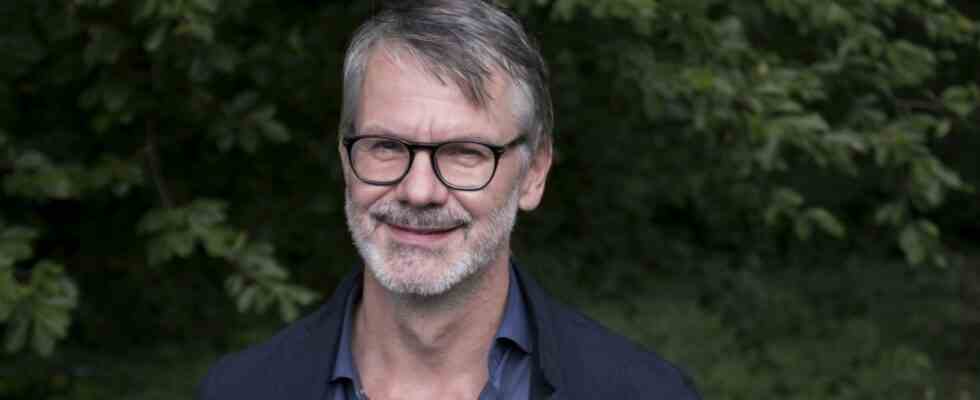“Uncanny how little we know about the very near future.” This is how an untitled poem begins in the new volume of poetry by the multi-award-winning poet and Essayist Durs Grünbeinand it actually seems a bit spooky how much this line proves to be a prophecy of the reading feeling that will gradually arise over nine chapters.
“Equidistance” is an elegiac book that is largely dedicated to remembering and looking back: Grünbein, who grew up in Dresden, who has spent a lot of time in Berlin and has (also) been living in Rome for years, thinks again about the time of reunification, visits well-known postcard motifs of the myth “Wild Berlin” and walks through the scenes of the German longing for Italy. Linguistic stumbling blocks occasionally appear between these nostalgic scenes: the dead on the escape routes to Europe, a concentration camp on the edge of the pretty hiking trail through the Brandenburg Forest. The strange thing about these disruptive factors, however, is that they hardly disturb – they fit in too easily with the almost state-supporting tone that runs through the entire volume, interrupted by a few remarkable jokes: “You saw him shining through the tree trunks: the Wannsee, the mad lake”; or, in a poem about snow: “White is the dominant color at the edges of the world, at the poles. What does Poland have to do with it?” Apparently nothing, in any case this question is not pursued further in the rest of the poem.
Do poets need problems to be allowed to write?
“Uncanny how little we know about the very near future”: Presumably neither the publisher nor the poet could have guessed anything about the approaching war in the Ukraine when preparing this volume. And, of course, it’s easy to argue about what kind of poems are needed after February 24, 2022 – or whether they are needed at all, as the Ukrainian poet Halyna Kruk recently said at the start of the Poetry Festival Berlin asked. But even if one is convinced of the necessity of poetry, especially in times of war and catastrophe, one cannot completely push aside a certain irritation when reading several Grünbein poems, which primarily deal with the annoyingness of insect bites: “One hears the hum, a bomber roar. / The third world war of insects has broken out. / No sleep is slept all night. / In the morning the backs of the hands, the feet / are covered with red wounds that burn, burn.” Aside from the imagery, which seems painfully inappropriate given the current world situation, with poems like these, which are also largely surrounded by bourgeois reminiscences of Greek or Latin classics, there creeps in the feeling that someone is writing here whose biggest problem is a mosquito bite.
Do poets need problems to be allowed to write? Not necessarily. But a certain degree of urgency and willingness to go where it becomes uncomfortable for oneself – that could be expected from an author like Grünbein, who intervenes in the public discourse elsewhere and has in the past, for example, taken a position against the Pegida movement in his hometown or anti-Semitic and racist statements by other writers.
“Poems are not there to express things incomprehensibly, but to express the incomprehensible,” poet Ramy Al-Asheq once said. Of the many attempts to define this notoriously elusive genre, this is perhaps one of the most compelling: poetry can articulate what previously had no language. It is a mode of recognition, of making things comprehensible and talkable, of literally putting things into words.
Durs Grünbein: Equidistance. poems. Suhrkamp, Berlin 2022. 183 pages, 24 euros.
Grünbein succeeds in such a mode of sudden visualization in some of the poems in the second part of his volume, in which he combines postcard motifs from the 1930s with the text on the back of the very same postcards. This discovered objects allow impressive exaggerations, for example in the form of a postcard on which the avenue Unter den Linden can be seen in festive decorations and on the back of which Ilse writes to her friend Irma in Vienna that the German capital interests her “not the bean”, while Grünbein , describing the sunlit motif on the front of the card, adds: “August 36 […] Germany shows itself / from its chocolate side. / Berlin greets the world.”
Otherwise, however, Grünbein’s sedate language mainly repeats what is already known. Precisely in passages where the point is to do what perhaps only poetry can do – to give linguistic contours to the unspeakable despite everything – general platitudes are needed that are good and familiar for a long time. Where things could get scary, the text assures itself and its readers that they are on the right side: as a world champion of memory whose past has been thoroughly worked up. This is also helped by the fact that Grünbein, for example, describes the end of the 1920s as a time “when the guides for the blind in Europe decided / to take their populations hostage”. That the populations of Europe had no active part in the coming fascism is a daring thesis, at least with regard to Germany.
“No comparison, that was: / Only a myth will remain. / How do you slaughter a myth?” asks one of the poems in reference to the Third Reich. A good question. Unfortunately, “equidistance” remains the opposite of myth butchery; perhaps more of a leisurely visit to a museum on a Sunday afternoon or a motto volume on the subject of “the end of history” that is thirty years out of date.

